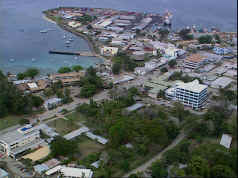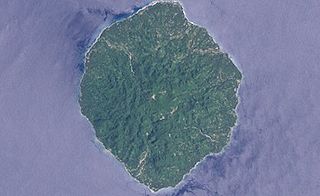
Freedom of religion in Pakistan is guaranteed by the Constitution of Pakistan for individuals of various religions and religious sects.

Islam is one of the major religions practiced widely in Ghana. Its presence in Ghana dates back to the 10th century. The population of Muslims in Ghana is about 20%.

Islam in Vanuatu is a minority religion. Roughly 1,000 Muslims according to online estimates

Mirza Masroor Ahmad is the current and fifth caliph, and leader of the worldwide Ahmadiyya Muslim Community. He was elected as the fifth successor of the founder of the movement—Mirza Ghulam Ahmad—on 22 April 2003, three days after the death of his predecessor Mirza Tahir Ahmad, the fourth Caliph of the Ahmadiyya Muslim Community.
The Indonesian constitution provides for freedom of religion. The government generally respects religious freedom for the six officially recognized religions: Islam, Protestantism, Catholicism, Hinduism, Buddhism, and Confucianism. However, ongoing restrictions, particularly on religions not sanctioned by the government and sects of the recognized religions considered deviant, are exceptions. Questioning any of the six above can lead to five years in prison for "insulting a major religion" and six more years if the Internet is used.
The majority of the population in Solomon Islands is Christian, with a majority of Christians belonging to Protestant churches. The constitution of Solomon Islands establishes the freedom of religion, and this freedom is respected in practice by both the government and general society.
Religion in the Marshall Islands has been primarily Christian since the religion was introduced by Western missionaries since around 1857. The government generally supports the free practice of religion, although the minority Ahmadiyya Muslim community has reported some harassment and discrimination.

Islam is a minority religion in the island nation Tuvalu. With the introduction of Islam in 1985 by Ahmadi Muslims, there are approximately 50 Muslims in the country, of which all are members of the Ahmadiyya movement. Due to the country's small population, this represents 0.5% of Tuvalu. The Tuvalu Mosque, in Funafuti, the capital of Tuvalu, is the only mosque in the country.

Ahmadiyya is an Islamic revival or messianic movement founded in Punjab, British India, in the late 19th century. It originated with the life and teachings of Mirza Ghulam Ahmad (1835–1908), who claimed to have been divinely appointed as both the promised Mahdi and Messiah expected by Muslims to appear towards the end times and bring about, by peaceful means, the final triumph of Islam; as well as to embody, in this capacity, the expected eschatological figure of other major religious traditions. Adherents of the Ahmadiyya—a term adopted expressly in reference to Muhammad's alternative name Aḥmad—are known as Ahmadi Muslims or simply Ahmadis.

Ahmadiyya is an Islamic movement in Indonesia. The earliest history of the Community in Indonesia dates back to the early days of the Second Caliph, when during the summer of 1925, roughly two decades prior to the Indonesian revolution, a missionary of the Community, Rahmat Ali, stepped on Indonesia's largest island, Sumatra, and established the movement with 13 devotees in Tapaktuan, in the province of Aceh. The Community has an influential history in Indonesia's religious development, yet in the modern times it has faced increasing intolerance from religious establishments in the country and physical hostilities from radical Muslim groups. The Association of Religion Data Archives estimates around 400,000 Ahmadi Muslims, spread over 542 branches across the country.

Between 0.22% and 2.2% of Pakistan's population is Ahmadi. Hence Pakistan is the home to the largest population of Ahmadis in the world. The city of Rabwah in Punjab, Pakistan used to be the global headquarters of the Ahmadiyya Community before they were moved to England. The Ahmadiyya population in Pakistan has often come under persecution and discrimination by the Sunni majority.

The earliest history of the Community in Sierra Leone dates back to the early period of the Second Caliphate, when at least six people are said to have conveyed their adherence to the faith. However, it was not until 21 years later, in 1937, that Nazir Ahmad Ali, the first permanent missionary arrived in the territory, in what was then a British colony. Today, there are perhaps 500,000 Ahmadi Muslims in the country, 8% of the populace.

Ahmadiyya is an Islamic religious movement originating in 1889 in northern India around the teachings of Mirza Ghulam Ahmad (1835–1908), who claimed to have been divinely appointed as both the promised Mahdi and Messiah expected by Muslims to appear towards the end times.

Islam is a minority religion in the Marshall Islands. All Muslims in the country belong to the minority Ahmadiyya sect. The Ahmadiyya mosque in Uliga, first constructed in 2012 in the Marshall Islands is the only mosque in Oceania's subregion of Micronesia. According to a 2009 report there were about 10 Muslims in the Marshall Islands, although more recent reports indicate about 150 believers in the country.

The Ahmadiyya movement in Islam has relationships with a number of other religions. Ahmadiyya consider themselves to be Muslim, but are not regarded as Muslim by mainstream Islam.

Ahmadiyya is an Islamic branch in the United States. The earliest contact between the American people and the Ahmadiyya movement in Islam was during the lifetime of Mirza Ghulam Ahmad. In 1911, during the era of the First Caliphate of the Community, the Ahmadiyya movement in India began to prepare for its mission to the United States. However, it was not until 1920, during the era of the Second Caliphate, that Mufti Muhammad Sadiq, under the directive of the caliph, would leave England on SS Haverford for the United States. The U.S. Ahmadiyya movement is considered by some historians as one of the precursors to the Civil Rights Movement in America. The Community was the most influential Muslim community in African-American Islam until the 1950s. Today, there are approximately 15,000 to 20,000 American Ahmadi Muslims spread across the country.

Ahmadiyya is an Islamic branch in Ghana, under the spiritual leadership of the caliph in London. The early rise of the Community in Ghana can be traced through a sequence of events beginning roughly at the same time as the establishment of the worldwide Community in 1889 in India itself. It was during the early period of the Second Caliphate that the first missionary, Abdul Rahim Nayyar was sent to what was then the Gold Coast in 1921 upon invitation from Muslims in Saltpond. Having established the Ahmadiyya movement in the country, Nayyar left and was replaced by the first permanent missionary, Al Hajj Fadl-ul-Rahman Hakim in 1922. Today, at 16%, which roughly corresponds to 635,000 people, Ghana hosts the largest proportion of Ahmadi Muslims to the wider Muslim population by country.

Ahmadiyya is an Islamic community in Guinea-Bissau, under the leadership of the caliph in London. First established in the country in 1995, during the era of the Fourth Caliphate, the Community represents an estimated 2% of the country's Muslim population, corresponding to approximately 13,000 people.

Ahmadiyya is an Islamic movement in Australia, first formally founded in the country in the 1980s, during the era of the fourth caliph. However, the history of the Community dates back to the early 20th century, during the lifetime of the founder of the movement, Mirza Ghulam Ahmad, with the first contacts arising as a consequence of Australians travelling to British India, and also as a consequence of early, "Afghan" camel drivers settling in Australia during the mid to late 19th century. Today there are at least four mosques, in four of the six Australian states, representing an estimated 3,000 Australian Ahmadi Muslims in the country.

Ahmadiyya is an Islamic community in Kyrgyzstan, whose teachings were first brought into the country by foreign Pakistani missionaries in the early 1990s. Although the Community was first registered in the country in 2002, its registration was struck off with the country's State Commission on Religious Affairs refusing to re-register it in 2011. Today, the Community which faces religious persecution, represents up to 1000 members spread across the capital Bishkek and three other regions of the country.












